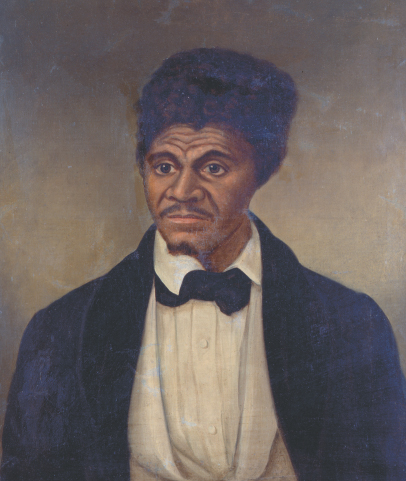The Dred Scott Decision.
Printed Page 376 Chapter Chronology
The Dred Scott Decision. Political debate over slavery in the territories became so heated in part because the Constitution lacked precision on the issue. In 1857, in the case of Dred Scott v. Sandford, the Supreme Court announced its understanding of the meaning of the Constitution regarding slavery in the territories. The Court's decision demonstrated that it enjoyed no special immunity from the sectional and partisan passions that were convulsing the land.
In 1833, an army doctor bought the slave Dred Scott in St. Louis, Missouri, and took him as his personal servant to Fort Armstrong, Illinois, and then to Fort Snelling in Wisconsin Territory. Back in St. Louis in 1846, Scott, with the help of white friends, sued to prove that he and his family were legally entitled to their freedom. Scott argued that living in Illinois, a free state, and Wisconsin, a free territory, had made his family free and that they remained free even after returning to Missouri, a slave state.

In 1857, Chief Justice Roger B. Taney, who hated Republicans and detested racial equality, wrote the Court's Dred Scott decision. First, the Court ruled that Scott could not legally claim violation of his constitutional rights because he was not a citizen of the United States. When the Constitution was written, Taney said, blacks "were regarded as beings of an inferior order ...so far inferior, that they had no rights which the white man was bound to respect." Second, the laws of Dred Scott's home state, Missouri, determined his status, and thus his travels in free areas did not make him free. Third, Congress's power to make "all needful rules and regulations" for the territories did not include the right to prohibit slavery. The Court explicitly declared the Missouri Compromise unconstitutional, even though it had already been voided by the Kansas-Nebraska Act.
Dred Scott decision
1857 Supreme Court decision that ruled the Missouri Compromise unconstitutional. The Court ruled against slave Dred Scott, who claimed travels with his master into free states made him and his family free. The decision also denied the federal government the right to exclude slavery in the territories and declared that African Americans were not citizens.
The Taney Court's extreme proslavery decision outraged Republicans. By denying the federal government the right to exclude slavery in the territories, it cut the legs out from under the Republican Party. Moreover, as the New York Tribune lamented, the decision cleared the way for "all our Territories ...to be ripened into Slave States." Particularly frightening to African Americans in the North was the Court's declaration that free blacks were not citizens and had no rights.
In a seven-to-two decision, the Court validated an extreme statement of the South's territorial rights. John C. Calhoun's claim that Congress had no authority to exclude slavery became the law of the land. White Southerners cheered, but the Dred Scott decision actually strengthened the young Republican Party. Indeed, that "outrageous" decision, one Republican argued, was "the best thing that could have happened," for it provided powerful evidence of the Republicans' claim that a hostile "Slave Power" conspired against northern liberties.